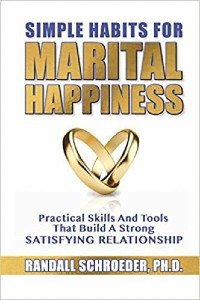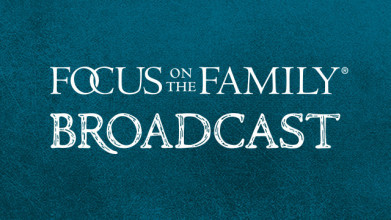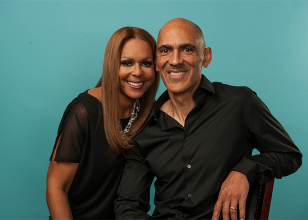Preview:
Dr. Randy Schroeder: Praise creates positive energy in a marriage and it’s interesting to me every counseling session…. I’ve done thousands and thousands of counseling sessions with couples. Every session I begin with a couple, I have them appreciate each other.
End of Preivew
John Fuller: Dr. Randy Schroeder joins us again today on Focus on the Family, and we thank you for joining us. I’m John Fuller, and your host is Focus president and author, Jim Daly.
Jim Daly: John, I think we both agree the conversation last time was so helpful. There’s so many great little deposits of wisdom that Randy provides in his book, Simple Habits for Marital Happiness. I mean, you could just start taking little notes.
John: Yeah. He’s got a way to make things stand out and be remembered with some great hooks.
Jim: It’s perfect. We discuss simple choices that really strengthen your connection with your spouse. Who doesn’t want that? Things like saying thank you and reconnecting for two minutes at the end of the day. Saying I love you when you leave the house, saying I love you when you go to bed at night. They… You think of those as just, you know, you know, fluff, but couples that practice those habits have happier marriages. And it doesn’t take a lot, but it’s thoughtfulness that counts.
John: Mm-hmm.
Jim: And I’m looking forward to another part of that discussion today.
John: Yeah. And if you missed anything, uh, from the previous conversation, we’re available on YouTube. You can find us wherever podcasts are at. Stop by our website. Our number is 800 AFAMILY, 800-232-6459, and, uh, you’ll find us at focusonthefamily.com/broadcast. And Dr. Randy Schroeder is a former seminary professor. He’s a pastor and a marriage and family counselor. He’s written a number of books and, uh, we’re gonna come back to one that’s, as Jim said, very, very accessible and very practical. It’s called Simple Habits for Marital Happiness. Uh, the subtitle is: Practical Skills and Tools That Build a Strong Satisfying Relationship.
Jim: Randy, welcome back to Focus.
Dr. Schroeder: Well, it’s a privilege to be with you and I look, uh, forward to talking more about habits that lead to successful, happy marriage.
Jim: Okay, let’s start. Uh, we’ll pick up last time and hopefully, folks, there are so much great practical information in the broadcast yesterday. I picked it up, like John said, smartphone apps are great way to get it, but let’s pick up from last time. Um, listening, uh, can be a man’s worst enemy. We’re kind of thinking of things and we’re not fully… I mean, the other night, I did this. Jean asked me. We’re at a fast-food restaurant. She said, “Can you get me a cup of ice?” And I went, got the cup, filled it with ice, and filled it with water, and I brought it back. And she said, “No, no. No, I just wanted a cup of ice.” “Oh, oh…” I go back, I throw the ice water away and bring her the cup back.
Dr. Schroeder: (laughs).
Jim: I’m serious. We were on a long drive. We were on a nine-
John: It must’ve been after, like, four or five o’clock in the afternoon.
Jim: … we were on a nine-hour drive, so maybe my mind was just spongy. And she said, “Oh, my. I just want a cup of ice.”
Dr. Schroeder: (laughs).
Jim: Well, thank you, let me go get that. I think I got it now-
Dr. Schroeder: Yeah.
Jim: … since the other two ways didn’t work for us here. But I mean, it was like a listening block. I literal-… I’ve never done something like that before, but I was not computing what she was saying.
Dr. Schroeder: (laughs) It happens to all of us and, uh, yeah, we need to strive to be world class listeners, and I think a good way to do that is to ask two questions of our spouse. You know, the first question is kind of a warmup question. You know, it could be, “How was your day today?” And the follow up question really makes our spouse feel special and valued, okay. And so, uh, the two consecutive guideline helps a lot of relationships and helps us listen well, because a lot of times, individuals, we see this even in life where I ask a question to you and say- say, “How was your day?” And you say, “Well, it didn’t go real well.” And rather than say what didn’t go well, they start talking about their day. And so two consecutive questions really forces spouses to express interest in their partner, and that makes a difference in the relationship.
Jim: Oh, I like that. Uh, you counseled a woman who corrected her husband all the time. I think this is very instructive too, because I think everybody could see a little bit of that in your relationship, I would think. I mean, that happens with Jean and I. Um, the question is how often (laughs) does that happen and to what degree? So, this is a great illustration of unhealthy correction.
Dr. Schroeder: Yeah. And- and there’s a difference, I would say, between constructive correcting or criticizing and expressing wants and needs or expressing expectations. But a major predictor for an unhappiness, separation, and divorce is criticism, where one spouse is just critical and complaining all the time and- and- and they’re never satisfied, and often they’re perfectionistic. They’re- they can be critical of themselves, critical of their spouses, critical of their kids. And in fact, this couple that I mentioned in my book, uh, she criticized her husband all the time for everything. She criticized him on how he’d ate ice cream, if you can believe it.
Jim: I’d get out of the way. I wouldn’t criticize anybody on how to eat ice cream. Man, that’s dangerous territory.
Dr. Schroeder: Yeah, that is. I mean-
Jim: (laughs).
Dr. Schroeder: … it’s good you just wanna get it- get it down to your tummy. And so and- and she criticized him on how he put the trash liner in the trashcan, and so-
Jim: That will may make a little more sense (laughs).
Dr. Schroeder: And so I suggested, uh, to the couple, I said, “Let’s try an experiment.” I said, uh, because he was just beaten down, you know, and- and criticism will do that. And so, I suggested for one week they both avoid criticism, constructive corrections, complaining, and immediately, the husband said, “That’s a great idea.” And he s- he said- he said, “No, I wanna go two weeks.” He said, “No, I wanna go three weeks.” And he said, “No, I wanna go a whole month.”
Jim: Yeah.
Dr. Schroeder: And the wife said, “That’s a dumb idea. I need to continue to correct him when he does things that I think are not right.” And she would not do it. Now, she also had adult kids that struggle. I mean, they’ve been married over 25 years and- and she was constantly criticizing pretty much everyone in her family.
Jim: Can I ask you this? Because, um, you know, it’s a great example of what not to do.
Dr. Schroeder: Mm-hmm.
Jim: As a counselor, where did she learn that, because it’s counterintuitive. It’s not a healthy way to do human relationships, certainly not a healthy way to do marriage, but do you ever find a commonality there as a child, what she was seeing? ‘Cause I think we- we grow up learning these habits from our own family of origin so often.
Dr. Schroeder: Oh, sure.
Jim: So, what do you think- what do you think her childhood was like?
Dr. Schroeder: Well, yeah, and you hit the nail on the head. You know, our parents did the best job they could. Uh, they had virtues, they had flaws. It’s good to recognize their positive attributes and bring those patri- attributes into our adult lives and into our adult relationships, including our marriages. But whatever flaws they had, we wanna try to overcome those flaws and not bring them into our personal life, our relationships. And I’m sure-
Jim: We need to create new flaws (laughs).
Dr. Schroeder: (laughs). I like your sense of humor, Jim. Uh, but- but, yeah, but not, you know, she-
Jim: But it’s true. It’s good. Bring the good stuff, leave the bad stuff.
Dr. Schroeder: She actually learned it from, uh, from her mom.
Jim: Yeah, I would think so.
Dr. Schroeder: Yeah.
Jim: Let’s move, uh, on the husband side, uh, to another extreme. Husbands in that situation or whenever there’s that critical spirit, those things that you’re mentioning. Husbands tend… We tend to just withdraw. We did it as little boys and we do it as adult boys. You know, when we’re being criticized, we just go into a cocoon and hear, “Wa, wa, wa, wa, wa.” And we stare at the TV, watching our football game or whatever. Speak to that isolation emotionally and how dangerous that is.
Dr. Schroeder: Yeah. It- it is very dangerous. In fact, research studies have found there’s four patterns that lead to divorce, and withdrawal is one of those patterns. And- and-
Jim: I would think that’s a typical husband. You know, correct me if I’m wrong but I would just think that more husbands withdraw than- than wives. Wives-
Dr. Schroeder: Yeah.
Jim: … can go on the attack.
Dr. Schroeder: No, you’re- you’re right. And- and, uh, husbands have a tough time discussing things.
Jim: Right.
Dr. Schroeder: You know, wives like to discuss things even hurts and disappointments, and so, yeah, you’re correct. Husbands have a tendency there. What’s really important, I think, is to go to Ephesians 4: “Speak the truth, God tells us in love.” And so, we need to use what I have, a speak the truth love formula. The first step is to identify words and behaviors. “When I heard you say this or when I saw you do that, I felt…” And it’s always good to use hurt and disappointed. Never underestimate… A couple can- should never underestimate the power of words. Do not use words like angry or mad or frustrated or resentful. Always, I suggest to couples use hurt or disappointed, so it’s when I heard you say this or when you heard you correct me all the time, I feel hurt and disappointed because I feel beaten down. And so, the fourth step is offer a solution. Like they say in the business world, don’t bring me a problem unless you have a solution. Well, then offer a solution. Now, the wife doesn’t have to agree, or the husband doesn’t have to agree with this solution, but that speak the truth and love formula overcomes what you just mentioned, Jim, withdrawal. So that they do talk about their hurts and disappointments, and yet offer a solution.
Jim: Randy, let me ask this question, too. Um, so often with the Christian context, you know, two committed people, we will evaluate the fact that we don’t disagree much, or we don’t ever argue as a spiritual virtue. And I would think in a counseling environment, as a counselor, that’s admirable but then you start asking yourself, “How deep is this going?” ‘Cause if they can live at that level, they’re obviously not occasionally bumping into each other emotionally, which means they may not be interacting as deeply as they should. So, speak to that and maybe even give an illustration where the couple is saying, “You know what? It’s Chris-…” And we- we get that kind of response here when we have a guest on who says, “You know, our marriage was rocky.” Well, if you’re a Christian and you’re in your marriage, you shouldn’t have rocky. And we’ve never argued. I mean, I can remember getting some of that correspondence here at Focus, and I thought, “Wow, that marriage might be in as much trouble as the other one. The just don’t know it.”
Dr. Schroeder: Exactly. You said it, uh, excellently. And they’re not emotionally close. You know, we’re gonna have hurts and disappoints. You know, it- it maybe we’re not getting enough hugs from our spouses or maybe, uh, we want, uh, more conversation and they’re not giving enough conversation. Uh, for, again, 25 years, I was a seminary professor. I remember a seminarian in my class, we were gonna talk about, uh, you know, how do you handle those hurts and disappointments. And he raised his hand, you know, again, married 25 years and he said, “Dr. Schroeder,” he said, “My wife and I have never had a disagreement.” And- and, you know, I wasn’t gonna embarrass him in front of the whole class, I just said, “Well, that’s nice. Thanks for sharing.”
Jim: (laughs).
Dr. Schroeder: (laughs) But-
Jim: See you after class.
Dr. Schroeder: … I- I felt sad because he does not have a close relationship. Uh, we- we can respect each other’s differing opinions, differing viewpoints, we can respect each other when they- when they- our spouse will share a hurt with us, but that keeps us close to do that talking together about what we can do to make it better.
Jim: And I- I think it’s- it’s kind of when you have that, a- a healthy intensity in the relationship. It’s actually good. It’s what God intends. I mean, we are two imperfect people, but you should be colliding here and there, and working that out healthy, in a healthy context.
Dr. Schroeder: And- and I would say the “colliding” i- is respectful.
Jim: Yeah.
Dr. Schroeder: You know, yeah, you wanna- you wanna be respectful, disagree, yes; disrespect, no.
Jim: Let me also ask you, um, some will be familiar with this rule, but remind us the “I” messages as you’ve mentioned that a few times. I observe, I… What are the “I” messages versus the- the- the you messages?
Dr. Schroeder: Well, and that- that’s kind of it, the speak the truth and love, you know.
Jim: Yeah.
Dr. Schroeder: When- when I see you do this or when I hear you say that, you know, I feel hurt or disappointed, and we should never… We need to never begin with you unless we’re gonna praise our spouse.
Jim: Mm-hmm.
Dr. Schroeder: If we’re gonna say, “You’re a wonderful Christian wife or you’re a wonderful Christian husband.” Uh, we wanna avoid you use attacking, that’s a three-letter word to forget. The word but, forget that one. And why also is attacking, and so we don’t wanna do that either.
John: Well, we’ve learned, uh, a lot along the way here. We still have more to come on this episode of Focus on the Family with Jim Daly. Our guest is Dr. Randy Schroeder, and, uh, we’re uncovering a lot from his book, Simple Habits for Marital Happiness: Practical Skills and Tools That Build a Strong Satisfying Relationship. Contact us today for your copy of that book and, uh, other helpful resources for your marriage. Our number is 800, the letter A, and the word FAMILY. Or stop by focusonthefamily.com/broadcast.
Jim: Randy, you mentioned in the book, when you disagree with your spouse, you recommend a soft startup. Now, being Irish, I don’t know anything… What do you mean a soft startup? I wanna go right to the issue. Let’s go. Let’s tackle it. What’s a soft startup?
Dr. Schroeder: That- that- that is absolutely essential. And again-
Jim: (laughs).
Dr. Schroeder: … I’ve done a lot of marriage research, uh, reading and, uh, harsh beginnings lead to hard endings almost 100% of the time.
Jim: Okay, this is a proverb now.
Dr. Schroeder: And that-
Jim: (laughs) That’s what it sounds like.
Dr. Schroeder: Yeah, and harsh endings, uh, often lead to divorce, and so we need to have soft startups, as you just asked about. And, uh, what I should-
Jim: Yeah, what’s the example?
Dr. Schroeder: I should define a harsh beginning first. “You know, you always, you never, you’re stupid, you’re dumb, we need to talk. I got an issue. We’ve got a problem.” You know, that’s a harsh beginning and the other spouse have immediately puts up a defense wall. And so, a soft startup is, “I need your help.” As Christian people, the three of us wanna be helpful for others. That’s why you do what you do, serving our Lord Jesus here at Focus on the Family. And so I need your help is disarming, and I can’t tell you how many couples have said, “That made a huge positive difference in our marriage relationship to use those words, ‘I need your help.’” Now, if it’s not a good time to discuss, the other spouse can say, “Hey, this is just not a good time.” Spouses need to be in a pleasant mood, a decent mood so they’ll have the energy to look for solutions rather than attack and blame. And- and the other… I always call it the terrific three. Uh, couples need to have discussions after nine in the morning, before nine at night, they need to always sit down, they to… so they’re not standing and yelling at each other. And they need to always begin with, “I need your help.” And those three simple yet effective habits, I would say those alone, besides all the other habits in the book, have saved probably 500 marriages from divorce. I’ve-
Jim: That you’ve dealt with?
Dr. Schroeder: That I’ve counseled. Have said-
Jim: Yeah.
Dr. Schroeder: … have- have said to me, “Dr. Schroeder, those three simple yet very effective habits saved us- saved our marriage from divorce. Thank you.”
John: Mm-hmm.
Jim: Randy, also, let me- let me move to another… You know, today it’s such a taboo metaphor, but the rifle approach. What are you going after with the rifle approach? You gotta be careful in talking about this.
Dr. Schroeder: Yeah, that- that is another guideline, and in fact, uh, I have 16 guidelines on how couples can have respectful discussion. Uh, and that besides the stay inside the nines, always sit, I need your help, another guideline is take the rifle approach. The rifle has a single bullet, a shotgun shell has a lot of pellets, and- and so couples need to focus on one hurt or disappointment.
Jim: Okay, not a bunch?
Dr. Schroeder: Not a bunch because, uh, couples have a tendency to not just focus on issues at the time, but they’ll then go back in the past and- and just bring other things up. So, whatever the hurt or disappointment is, just focus on that solitary issue.
Jim: You encouraged couples, uh, to engage in dialogue, not monologue. This is probably a good parenting tip, too. I mean, uh, but the kind of the monologue doesn’t get you very far.
Dr. Schroeder: It… The monologue makes the other spouse feel talked and they feel, uh, almost treated like a child, that they’re being taught down to. And- and someone who doesn’t monologue wants to go on and on and on. There needs to be a nice ebb and flow when couples have a respectful disagreement discussion. Uh, it’s kind of like a tennis volley. You go out to get exercise, a husband and wife, and they hit the ball nicely back and forth to each other so they can keep it going and run around and- and get exercise and, uh, help their heart rate. And- and that likewise, that’s what needs to happen with a marriage relationship. That dialogue needs to be there where a spouse says three sentences, the other spouse echoes, “I heard you say, is that correct?” The spouse says another three sentences. “I heard you say, is that correct?” And then they exchange roles. This spouse becomes the speaker, that spouse becomes the listener within echo, “I heard you say. Is that correct?” I saw physician and his wife, and he would go for five minutes talking about a monologue (laughs). It’s almost a mini sermon. A- and- and his wife… Uh, he said, “I need to do that.” And I said, “Well, doc-
Jim: (laughs) He need to do that? That’s just funny hearing that.
Dr. Schroeder: Yeah, I said, “Doc,” I said, “you keep doing that, your wife is moving further and further away from you emotionally-
Jim: Oh, that’s interesting, yeah.
Dr. Schroeder: … you know, she is feeling- she is feeling attacked and she’s feeling talked at.” A- and the wife then spoke up and she said, “That’s it. I don’t feel that he’s talking with me. He’s talking at me.” And I encouraged the doc to give up his monologues and start going to three sentences or less or, four, just to be brief, and immediately, their marriage improved. They started having real, healthy discussions, understanding each other’s viewpoint, perspective, and it was just remarkable how quickly their marriage got healthy.
Jim: I was gonna ask you about that because, you know, again, the discipline of doing this, it’s kind of where we started. It was hopefully a little bit humorous, but it is- it’s a discipline that you have to have, and so often when you got to a counselor and you use the “I” words and you’re trying to impart into those couples these principles that work because you gotta slow down, you gotta think about what you’re about to say, you gotta try not to be harmful, aim for a good outcome. And practically, Randy, what’s so hard, and I get this, you’re in the heat of the moment. I mean, it’s emotional and-
Dr. Schroeder: Mm-hmm.
Jim: … you’re trying to respond, and you feel under attack. And it’s like your brain has a hard time going to this place called “adult” (laughs) and think about what you’re doing. Ho- how do you discipline yourself to back up in the emotional moment and say, “Honey, okay. Let’s just stop for a minute and let’s recalibrate this discussion.”
Dr. Schroeder: And- and I- I think that’s a- a good- good point, Jim, and I… God doesn’t use the word discipline, but God uses the word self-control in the fruit of the spirit, right? So, in a sense, I would say self-control, self-discipline, they’re synonymous.
Jim: It fits.
Dr. Schroeder: And- and- but I think what happens and- and why Simple Habits for Marital Happiness has made a huge difference is, so often, couples just read books about concepts and principles. And so, you can’t slow yourself down because you do not have the ability to slow yourself down, uh, the- without specific words and actions and knowledge. Uh, and so, having the- these, uh, habits allows the spouse to develop self-control. Unbelievable how parents can develop self-control and spouses develop self-control when they have the tools and the skills.
Jim: It’s so good. Uh, let’s move outside of that, uh, husband and wife relationship. The other one that can impact the marriage from outside is unhealthy friendships. And describe what you see there in some of the counseling sessions that you’ve had and how does a couple build a proper fence around those more toxic relationships? I would think, too… I mean, when the one spouse sees it and the other one doesn’t, that’s hard-
Dr. Schroeder: Yes. Yes.
Jim: … ’cause then it- then it’s an internal battle. “You know, honey, Susan is not a healthy person (laughs) and she’s leaning on you.” “But I love Susan. Susan’s so wonderful.” Okay, take it away.
Dr. Schroeder: Yeah. Well, and again-
Jim: (laughs).
Dr. Schroeder: … let’s go back to God’s word. You know, what is God’s word say in Proverbs? A- a wise walk with the wise and become wise. You know, walk with foolish people and you’re gonna suffer harm. And so God is telling us in word, “Watch your friendships. Your friendships can hurt your Christian walk. Your friendships can hurt your Christian marriage.” A- and so identify those friends because friendships should build up a marriage, not tear down a marriage. And it’s not just friends, it could be family members. You know, I’ve seen family members tear down a Christian marriage.
Jim: Randy, while I was reading the prep and looking at the book, uh, last night, actually, and doing the research I needed to do, I was talking to Troy and Jean. They were in the kitchen, and I was in the living room reading, and I got into that… I was reading that part about putting change, you know, five coins in your right pocket, and then every time you criticize or you’re critical of your spouse, take a coin out, put it in your left pocket. And then during the day, if you compliment your spouse or maybe your child in a parenting context, you take that coin out in your left pocket, put it in your right. And at the end of the day, how many coins you have in your right pocket, which is the goal. That’s a great… They both said, “That is brilliant.”
Dr. Schroeder: Well, and it- it’s a little different. I- I wanna start-
Jim: Okay, you can correct me.
Dr. Schroeder: … I wanna start out- I wanna start with the positive, Jim. So, yeah, every time they complement their spouse, then they get to move a coin from the right pocket to the left.
Jim: Okay. Yeah. Yeah, okay.
Dr. Schroeder: Yeah. So, where you start out, we want them to start hopefully complimenting, not criticizing. Start out complimenting, and hopefully the goal, uh, they’ll move five coins quickly. Now, sometimes women don’t have pockets in their pants, and I say, “You know, put five coins when you’re at home on a kitchen counter. And every time you compliment, move it over to the left side and start putting the five coins over here.” But when they criticize or correct or complain, now they gotta take this coin and bring it back. They- they don’t get to keep it over here on the left pile. And so, uh, it really helps a couple find out, “Am I good finder or am I fault finder?” You know, how often am I using the “C’s”.
Jim: Yeah, no, that’s a good exercise.
Dr. Schroeder: And so often when couples come and say, you know, “My spouse is just not appreciating me,” well, I say, “Let’s do the five-coin idea.”
Jim: You know, Randy, and again, that’s a great… One of the many great concepts you have in your book. Um, at the close here, let’s make sure we hit this and address. I think the theme, the thread of what we’ve been talking about that a happy marriage is not spontaneous. And so many couples, when they get married, they live on that vapor of the honeymoon and that may last a year or two, and then you get into the- the normalcy of life, and the children come along and the job and promotions and responsibility and you got the house payment now. All that stuff.
Dr. Schroeder: Yeah. Yeah.
Jim: And the critical nature of that to make sure that you’re putting effort into your relationship, it’s not spontaneous. It does take thought. It does take dialogue. It does take love to do this better. And for us in the Christian in the community, we should be the best at this ’cause through the spirit, as you’ve said over and over, is really the basis for how we should deal with one another. And couples will say, “It’s easy for me to do that with my friend. It’s not so easy for me to do that with my spouse.” (laughs).
Dr. Schroeder: And- and- and Jim, I am so happy that you brought this up and we got to talk about this, because if there’s one word that points out the difference between a happy marriage and an unhappy marriage, it is planning. A marriage institute… I think it was in Philadelphia. It’s something I read probably over 30 years ago that wanted to determine what is the difference between a happy and unhappy marriages. And what they discovered the difference to be was that one word, planning. Happy couples planned time together, whereas unhappy couples let their good times happen by chance. You know, happy, successful couples plan to go to church on Sunday. They plan to give each other a meaningful hug, a meaningful kiss today. They plan how we’re gonna connect tonight. When are we gonna turn of the technology and look at each other in the eyes and just talk? They plan for dates together to strengthen their marriage relationship. And so, yeah, you’re exact-… I’m glad you brought that up. That is the key is planning. Now, that being said, we need to know, uh, how to- the words and the behaviors and the knowledge to plan for a happy marriage. We still have to have that-
Jim: Yeah.
Dr. Schroeder: … but-
John: But yeah.
Dr. Schroeder: Planning is key.
Jim: And Randy, I mean, you have packed the book with so many very simple practical things to say and do in your marriage that get you the result that your heart is yearning for that kind of deep relationship. You just need to get your head moving in the right direction (laughs) and lead the way in so many ways to make sure the heart is blossoming. And I can’t stress it enough, I mean, this is one of the best resources I think we’ve come across when it comes to marriage. And if you want to, uh, again, correct a marriage that isn’t in desperate trouble, but you can do things to move it into a far healthier position, this is one of the top resources we could think of. And if your marriage is in a more difficult spot, we want you to get a hold of us and these principles will help. And I’m sure Randy’s gonna shake his head. These are the things that can turn around your marriage, but you may need a little more intensive application right now. We have Hope Restored. You can get in touch with us. It’s a four-day intensive. It’s got an 80% post two years success rate. Really, many of the things that Randy has talked about, they help teach you to apply to your relationship and it’s one of the best things going on at Focus. But we wanna get Randy’s book into your hands. If you can make a gift of any amount, monthly is wonderful, to join us in the ministry to help more and more marriages, uh, be strengthened in Christ or a one-time gift, we’ll send you a copy of the book as our way of saying thank you. If you can’t afford it, we’re a Christian ministry, we’re gonna get this into your hands and trust that other believers will cover the cost of that.
John: And donate as you can when you call 800, the letter A, and the word FAMILY. 800-232-6459. Or stop by our website for all of these resources and opportunities to give to the ministry, um, we’re at focusonthefamily.com/broadcast. Have a restful weekend and, uh, plan to be with us on Monday as we discuss how you and your spouse can be more intentional about adding some fun to your marriage.
Preview:
Kathi Lipp: You could go for a month and not have a real in-depth conversation except about the bills or maybe the trouble your kids and at school. And if you’re not pouring into that relationship, those conversations are so draining, you could end up feeling like, “Wow, this is really tough.”
End of Preview





















